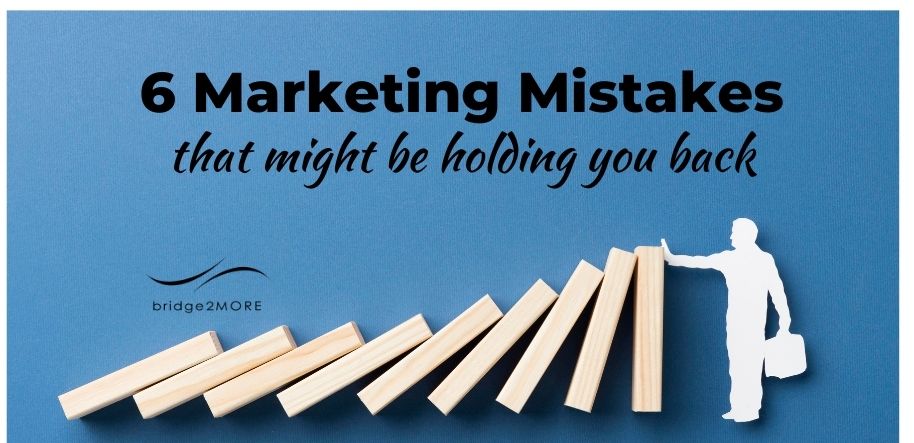By guest writer Nat Summers
Marketing is closely intertwined with the success of your business. It is so important, in fact, that respected management pioneer Peter Drucker once said of it: “Because its purpose is to create a customer, the business enterprise has two — and only these two — basic functions: marketing and innovation.” That’s because marketing is a means to bring innovation to consumers, and ultimately connect them to the right products or services, which ideally would be those that your business is offering.
Given marketing’s essential role, it isn’t surprising that doing it right can be challenging. A mistake or two can easily hold back the marketing efforts of any business, or derail them completely. For example, less-than-stellar marketing can potentially result in overspending on something that doesn’t work. But the worst consequence, according to a Chron article on poorly planned marketing, is low traffic, or the inability of the business to attract enough customers to continue making a profit.
This is the reason you need to revisit your marketing strategy to see if you are making the following six marketing mistakes, which might be holding your business back and keeping it from adding to its client base.
1. You’re undervaluing marketing
In recent years, marketing budgets have been cut back to just 11% of company revenue on average. In fact, big, international companies like Unilever and P&G have levelled off all marketing spending, while Starbucks has scaled back on their marketing staff. This trend is underscoring the increasing devaluation of traditional marketing as more companies are relying more on artificial intelligence to offer consumers information, products, and services.
Following this trend is a mistake for your small business, as unlike multinational firms such as Unilever, your brand doesn’t have the same popularity or client base just yet. Meaning, you can’t simply rely on algorithms and analytics to create the awareness your business needs to take off. This is why you shouldn’t underplay the role of marketing in brand building. Rather than devalue it, emphasise it more and allot a significant budget for it. Lauren Herpich, the owner of Local Food Adventures, a California-based food tour program told PR Newswire that she still sent out brochures as print marketing can help create memories for customers. Don’t just rely on the new digital forms of marketing, as small businesses need to create a much more personal connection than large corporations.
2. You’re not optimising your web content
Due to increasing connectivity, rising smartphone use, and the ongoing pandemic, consumers are going online more to find products and services. That means your business needs to be visible on Google and other search engines so potential customers can find your brand, and potentially transact with you. But as SEO marketing agency Ayima explains, establishing a strong presence online is difficult because search engine algorithms favour established companies that already have rich and robust content with link equity. This refers to authoritative and credible backlinks that smaller companies struggle to get due to a lack of awareness.
As such, you must optimise your web content to make your website searchable on the worldwide web. It is also why you need to familiarise yourself with search engine optimisation (SEO) and add that kind of expertise to your team. SEO is the process of improving a website so that organic traffic to it increases through better search engine visibility. This process is highly technical and can be labour intensive, so look to outsource it to experts in the field to get the best results.
3. You’re always comparing your marketing strategies to others
Comparing your business strategies to those of other companies isn’t necessarily wrong per se, but doing it can keep you from discovering your own style and unleashing your creativity. As Claudia Schalkx previously noted in a guide on marketing your own way, what works for one business won’t necessarily work for yours as every business is unique.
So, rather than look outward, look inward and scrutinise your marketing strategies. Research your audience and figure out the best marketing style for your business. Your company needs to feel unique and the more you play up your uniqueness the more likely you will stand out in an increasingly growing field of competition. Going with the crowd will only mean you get lost within it.
4. You’re not in tune with trends
Climb Online’s Mark Wright explains that keeping track of trends is the key to staying competitive. After all, trends will give you concrete ideas as to which media will reach the most people and what strategies will lead to greater engagement. An example of a key marketing trend today is the use of video content in digital marketing, with industry leaders projecting that video will make up 80% of worldwide internet traffic this year.
Knowing this trend (and all others) means you’ll be able to focus your marketing efforts on strategies that are more likely to work. To stay on top of trends, though, will necessitate due diligence in doing extensive market research, keeping a pulse on social media, reading up about marketing, and consulting with industry players and fellow business leaders.
5. Your conception of success is myopic
While it is true that marketing should translate to sales, you’d be remiss if you measure the success of your marketing campaigns solely by that metric. That’s because generating sales takes time, and you might prematurely pull the plug on an otherwise great marketing campaign if you don’t see increased sales right away.
It’s best to consider other indicators when assessing the efficacy of a marketing effort. For example, you can review if it is changing customer perception positively. Check if it is increasing email newsletter signups and generating more social media engagement. These are all positive signs and an indication that something’s working and, therefore, deserves to be continued.
6. You’re not exploring other marketing channels
There are many platforms that companies can use to reach an audience, and yet many use just one or two. Making this same mistake will keep you from connecting and engaging with a wider audience, as a bulk of them might not actually be on the limited channels you are using. For example, you might still be over-relying on running ads on printed newspapers or magazines, when you should be leveraging social media more.
To rectify this mistake, entrepreneurs at Inc. recommend doing multichannel marketing where you utilise multiple platforms—print, social media, direct mail and text messaging—to run the same marketing campaigns. In this way, you’ll be able to expand your reach and create a greater impression on people. Just make sure that you stay consistent in your messaging and give potential clients content that will resonate with them. Use automation in social media as well, as doing so will make it easier to put out content regularly and to stay in touch with different individuals. Then again, it’s also worth noting that when it comes to social media, you shouldn’t try to be active in two or more platforms at once without mastering the ropes of one platform first. It’s best to figure out if a social media site works for you before you move on to a different one.
Competition in business is cutthroat, with your company competing with so many others for the same market. This is the reason you need your marketing efforts to be on-point, so you can reach your target audience, engage them better, and entice them to transact with you and not with your competitors. Avoiding the six marketing mistakes above will help you in that regard.
—–
Nat Summers is a seasoned freelance writer whose passion lies in digital marketing and advertising. When she’s not looking up industry trends, she’s improving her culinary prowess.
Image by Freepik







